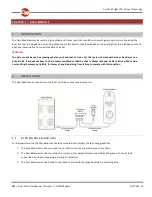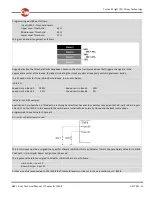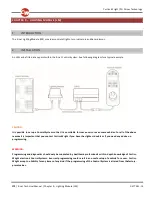
Curtiss-Wright | PG Drives Technology
SK77981-14
165 | R-net Technical Manual | Chapter 8 – ISM-8
5.2.10 ENDSTOP AUTODETECT
This enables or disables the automatic endstop function for a particular actuator channel. Automatic en dstop detection is a
technique that uses actuator motor current to detect if an endstop has been reached. Upon detection, drive to the actuator
motor is automatically cut. This technique removes the need for micro-switches at end limits.
The programmable options are Yes and No.
NOTE:
Automatic endstop can only be used with actuator Acceleration and Deceleration values of 100%. Automatic endstop may
not work well if the actuator takes a very low current.
5.2.11 ACTUATOR ENDSTOP TI MEOUT
This sets the amount of time the actuator motor current has to be above the endstop detection level (or actuator current limi t if
Endstop Autodetect is set to No) before the drive is cut. It is actually very rare to have to adjust this p arameter, but it can be
useful to prevent nuisance stopping, i.e. false detections of endstop.
The programmable range is 0 milliseconds to 500 milliseconds in steps of 10 milliseconds.
5.2.12 COMPLEX SEATING MODULE-CUSTOM
This is the branch designated for customer specific programming parameters. This branch will be used where the ISM-8 has
been customized by a wheelchair OEM to offer specific functionality that is different to what is delivered as standard by PG.
These parameters will need to be defined i n conjunction with Curtiss-Wright.
5.3
INHIBITS
INHIBITS EXPLAINED
The ISM-8 as 16 Inhibit Inputs, these are number 18-33. For connection details of these inputs, please refer to the Section 4 -
Connections.
Each of these inputs can recognize four different input conditions (or states). This means that four different events can originate
from a single input. The input can either be a resistive (passive) or a voltage source (active).
If the Inhibit Type parameter is set to Passive, then the associated inhibit input will be scaled to an analogue range of 0-100
where 0 represents 0Ohm to Gnd and 100 represents 10KOhms to Gnd.
If the Inhibit Type parameter is set to Active, then the associated inhibit i nput will be scaled to an analogue range of 0-100
where 0 represents 0V at the input and 100 represents 3.3V at the input.
See the following Speed Inhibit and Actuator Inhibit Examples assume a resistive input.
The state of an Inhibit input is defined as a percentage and is set by the resistance connected to the input.
If the input is connected directly to 0V, then it is considered to be at 0%.
If the input is connected to 0V via a 10KOhms resistor or greater, then it is considered to be at 100%.
















































